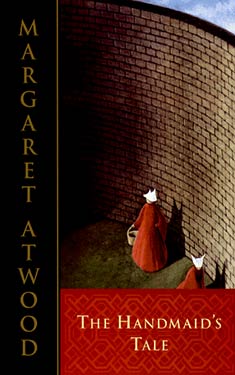3 Rs: Margaret Atwood’s The Handmaid’s Tale
 Review by WWEnder:
Review by WWEnder:
bazhsw
Posted: 4/14/2015
Thi s has been on my ‘to-read’ list for what seems like years. The novel’s reputation does precede it somewhat as I’m aware of it’s consideration of being a feminist classic.
s has been on my ‘to-read’ list for what seems like years. The novel’s reputation does precede it somewhat as I’m aware of it’s consideration of being a feminist classic.
My overwhelming impression after reading the novel is that it’s a good novel in terms of plot and story – I found it was one of the novels I couldn’t put down once I started reading it. That said, I didn’t find it a ‘great novel’. The plot is fairly linear and the characterisation limited although that’s necessary for the book – it’s not a story that will stay with me forever.
That said it is a very powerful book and I think this is why it is a necessary read for pretty much everyone! Atwood wrote this in the mid-80’s against a landscape of increased Christian Right influences in US culture. What is truly frightening is that whilst the current US does not resemble Atwood’s Gilead we do see Religious groups informing policy in much of the West and certainly in the US. Likewise, the reproductive rights of women is still a ‘debate’ in some areas of the West. We can see shades of Atwood’s Gilead today in the West. We can see it’s sta rk realisation in many other parts of the world.
rk realisation in many other parts of the world.
Many areas of the world oppress women to this day. Is Gilead any different from Taliban controlled Afghanistan and Pakistan. Do ISIS resemble Gilead? In much of the Islamic world from Saudi Arabia to Iran (whether they are a ‘friend’ of the West or not) women have no political rights, must cover their faces, are owned by fathers and men and their sexual identity repressed. Is female genital mutilation or the kidnap of girls in Nigeria that different from Gilead?
It’s not confined to the Islamic world either. Consider the sex trafficking of girls and women from Eastern Europe to the West, the sexual exploitation of girls and women in South East Asia, restriction to birth control in Ireland. In the West we quite often look at feminism through the lens of work and bemoan that women struggle to break the glass ceiling to positions of power. This is a classist position and considers the rights of well educated and privileged women above the millions of working class women. Gender politics often look at the experience of women from a middle class perspective. This ignores that working class women are oppressed significantly across the world – yes they can work (in low paid part time jobs), but they are still doing the cleaning, looking after the kids and getting tea on the table.
Gilead is a dystopian future but I do not think in the 20 years or so since this novel has been written that the lives of women across the world have improved very much, indeed it could be argued that things are worse.
 I found the naming of the Handmaids particularly troubling (Offred meaning ‘of Fred’s’). This did make me consider though we still have similar conventions (my wife took my surname when we were married). I guess it is the use of the first name that personalises this ownership so much. Furthermore, that we never knew Offred’s real name. I so wanted to discover it. I wanted her to have a name and an identity.
I found the naming of the Handmaids particularly troubling (Offred meaning ‘of Fred’s’). This did make me consider though we still have similar conventions (my wife took my surname when we were married). I guess it is the use of the first name that personalises this ownership so much. Furthermore, that we never knew Offred’s real name. I so wanted to discover it. I wanted her to have a name and an identity.
The dehumanisation and categorisation of women was powerful. One can see a limited male perspective of women – a Martha for the cleaning, a Handmaid for the breeding and a Jezebel for the entertainment. How often do men roll these characterisations into one and call it Wife?
It’s a novel of immense power and the use of power. Offred describes power relationships in the book but realistically she does not have any. It’s an indictment of societies mores and rules which everyone has to follow (except those in power). That the Commanders who wrote the rulebook are the ones that ignore it is a particularly strong message.
Well worth reading.



















 Full Details
Full Details


7 Comments
I’m currently reading Marilynne Robinson’s award winning novel “Gilead” which takes the form of a dying Congregationalist’s letter to his son. I’ve taking to wondering if Robinson’s use of the name is a riposte to Atwood’s. There is also certainly a reference to the African-American spiritual ‘There is a Balm in Gilead’ which Robinson uses positively and Atwood ironically.
Justified, Let us know what you think of Robinson’s book. I know that her work gets a lot of attention (and awards), but I’ve never read anything by her.
Rhonda
An excellent review
Thanks for your kind comments Buck.
Justified – the Anderson book could well be a response. Ultimately, a message of hope perhaps?
I listened to this book on tape, when it was really on cassette tapes. The reader had a very affected and condescending quality and turned me off from the story. That was back in the 80s. I need to give this another try and actually read it and reevaluate my perspective.
Steve, I remember it being a really fast read. And Atwood has a fluid writing style. I think it deserves all of the acclaim it gets.
Agreed with Rhonda. It’s the sort of thing that could easily have come across as preachy, but the focus stays on the characters and story, leaving the reader to work out the “message” (which unfortunately is just as relevant now as when the book came out). bazhsw’s review indicates the sort of reflections it leads to. An all-time favorite for me…
Sorry, the comment form is closed at this time.